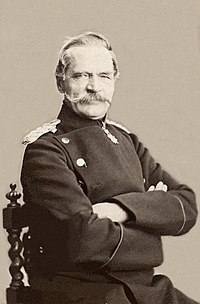Eugen Rathenau
This article is incomplete because it is pending further input from participants, or it is a work-in-progress by one author. Please comment on this article's talk page to share your input, comments and questions. Note: To contribute to this article, you may need to seek help from the author(s) of this page. |
Eugen Rathenau | |
|---|---|
 | |
| President of Volta | |
| In office 15 December 1864 – 3 March 1901 | |
| Vice President | Ludwig Mende (1864-1876) Bernard Heinze (1876-1884) Rudolf Bauer (1884-1896) Friedrich von Baden (1896-1901) |
| Preceded by | Office established |
| Succeeded by | Friedrich von Baden |
| Delegate of Schipe to the Voltan National Congress | |
| In office 4 February 1864 – 15 December 1864 | |
| Preceded by | Office established |
| Succeeded by | Office abolished |
| Commander in Chief of the National League Army | |
| In office 4 March 1859 – 25 January 1864 | |
| Appointed by | Voltan National League |
| Preceded by | Office established |
| Succeeded by | Hans Maurer |
| Representative of Schipe to the Voltan National League | |
| In office 7 April 1857 – 4 March 1859 | |
| Preceded by | Office established |
| Succeeded by | Ludwig Mende |
| Personal details | |
| Born | 9 July 1825 Schipe, Allenby colony (Seylosian Volta) |
| Died | 3 March 1901 Köstritz, Voltan Democratic Republic |
| Political party | National Party |
| Spouse | Mary von Puttkamer (m. 1850) |
| Occupation |
|
Eugen Rathenau (9 July 1825 – 3 March 1901) was a Voltan military officer, politician, and later dictator. He led the Voltan National League to victory in the Voltan War for Independence, and led the first Voltan National Congress. He became the first President of the Voltan Democratic Republic in 1864. He would later be the mastermind behind the 1876 Voltan coup d'état, after which he would seize absolute power and become a dictator.
His legacy remains controversial among Voltan diaspora community. Some view him as the "Father of the Nation" for his significant involvement in the Voltan War of Independence. However, he is viewed by many others as a brutal and racist dictator that formalized systematic racial discrimination in all sectors of life. These individuals usually also believe he set Volta on the path towards the Voltan Civil War and eventual communist takeover.
Eugen was a slave owner and owned over 500 indigenous Tlaloc slaves over the course of his life. The exact number of slaves he owned remains hotly debated as for a portion of his life these slaves were owned in secret, as Seylosian colonial authorities had abolished slavery shortly after he was born. Eugen was responsible for crafting legislation reinstating slavery in Volta after independence. He also was responsible for the management of 477 indentured servants of both Dolch and Mischling (mixed-race) ethnic origin.
During his time as president he violently suppressed several Tlaloc rebellions as part of the Voltan Tlaloc Wars, as well as taking full control of the south in the Huitzapan Wars. As a result of his involvement in these wars he is still remembered as an aggressive conqueror by Tlaloc and Huitzapan peoples to this day. He was a member of the Seylosian Protestant Church, and urged religious freedom in Volta.
Eugen was memorialized in Volta in many monuments, a national holiday, a few geographic locations, and on the currency of the Voltan Democratic Republic. However, since the end of the Voltan Civil War much of the monuments have been destroyed by the Communist Party of Volta, the national holiday retracted, geographic locations renamed, and currency designs changed. It is believed that none of these memorials in Volta remain today. Some of the monuments were preserved by the Voltan government-in-exile upon their escape from Volta, and are stored in some of their offices abroad. This practice remains controversial among Voltan diaspora communities.
Early Life
The Rathenau family was an extremely wealthy Pflanzer family living the western Voltan city of Schipe. This family had made their wealth off of a network of plantations in the area. Eugen's great-grandfather, Johann Rathenau, had emigrated from Panedonia to Schipe in 1724. He was involved in the founding of the city of Schipe, and partly through his involvement acquired over 2400 ha (6000 acres) of land.
Eugen was born on 9 July 1825 at the family home in Schipe, and was the second-born of 5 children. At this time his father, Karl Rathenau, was helping his grandfather manage the plantations. Karl Rathenau had personally been involved in organizing the local Pflanzer population at the time, and was working to make their grievances known to Seylosian colonial authorities. After Seylosian authorities abolished slavery in 1828, Karl left to take part in a meeting of Pflanzers in Köstritz. During this meeting the First Pflanzer War started, and though Karl attempted to avoid open rebellion he could not. After this Eugen's father spent several years in a local prison, after which Eugen developed a strong disdain for Seylosian colonial authorities.